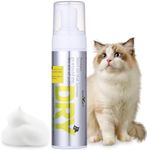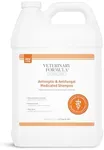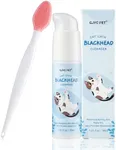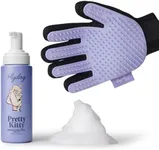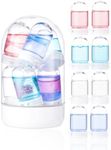Buying Guide for the Best Shampoo For Dog Yeast Infection
Choosing the right shampoo for a dog with a yeast infection is crucial for their health and comfort. Yeast infections can cause itching, redness, and discomfort for your pet, so selecting a shampoo that effectively addresses these issues is important. When picking a shampoo, consider the specific needs of your dog, such as their skin sensitivity, the severity of the infection, and any other underlying conditions. Here are some key specifications to look for and how to navigate them to find the best fit for your furry friend.Antifungal IngredientsAntifungal ingredients are essential in a shampoo for treating yeast infections as they help to eliminate the yeast causing the infection. Common antifungal ingredients include ketoconazole, miconazole, and chlorhexidine. Shampoos with these ingredients are effective in reducing yeast populations on the skin. If your dog has a mild infection, a shampoo with a lower concentration of these ingredients may suffice. For more severe infections, a higher concentration or a combination of antifungal agents may be necessary. Always consult with your veterinarian to determine the appropriate strength for your dog's condition.
Moisturizing PropertiesMoisturizing properties in a shampoo help to soothe and hydrate your dog's skin, which can become dry and irritated due to a yeast infection. Ingredients like aloe vera, oatmeal, and coconut oil are known for their moisturizing benefits. If your dog has sensitive skin or the infection has caused significant dryness, look for a shampoo with strong moisturizing properties. For dogs with less severe dryness, a shampoo with moderate moisturizing ingredients should be sufficient. Ensuring the skin remains hydrated can aid in the healing process and provide relief from itching.
pH BalanceThe pH balance of a shampoo is important because it ensures that the product is gentle on your dog's skin and does not disrupt the natural skin barrier. Dog skin has a different pH level compared to human skin, so using a shampoo specifically formulated for dogs is crucial. A pH-balanced shampoo helps maintain the skin's natural defenses against infections. For dogs with yeast infections, a shampoo with a pH level that matches their skin's natural pH (typically around 6.5 to 7.5) is ideal. This helps to prevent further irritation and supports overall skin health.
Hypoallergenic FormulaA hypoallergenic formula is designed to minimize the risk of allergic reactions and is particularly important for dogs with sensitive skin or allergies. These shampoos are free from common irritants such as artificial fragrances, dyes, and harsh chemicals. If your dog has a history of skin allergies or sensitivities, choosing a hypoallergenic shampoo can help prevent additional irritation and discomfort. For dogs without known sensitivities, a hypoallergenic formula can still be beneficial as it is generally gentler on the skin.
Medicated vs. Non-MedicatedMedicated shampoos contain active ingredients specifically designed to treat medical conditions like yeast infections, while non-medicated shampoos focus on general cleaning and maintenance. If your dog has a confirmed yeast infection, a medicated shampoo is typically necessary to effectively treat the condition. These shampoos often contain antifungal and antibacterial agents. For dogs prone to yeast infections but not currently experiencing an outbreak, a non-medicated shampoo with antifungal properties can help prevent future infections. Always consult with your veterinarian to determine whether a medicated or non-medicated shampoo is appropriate for your dog's needs.










